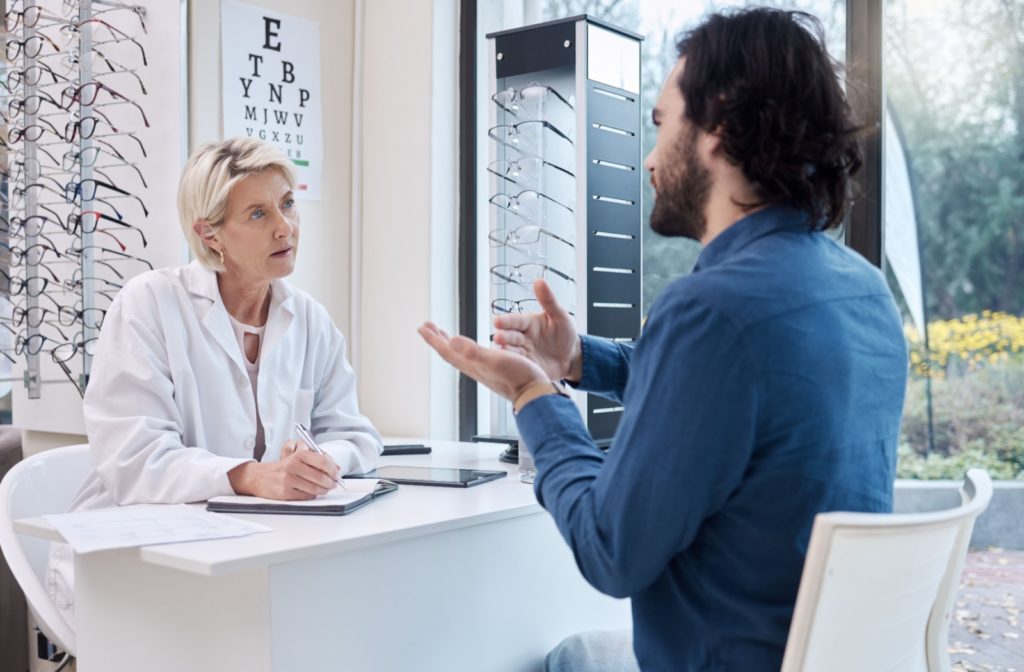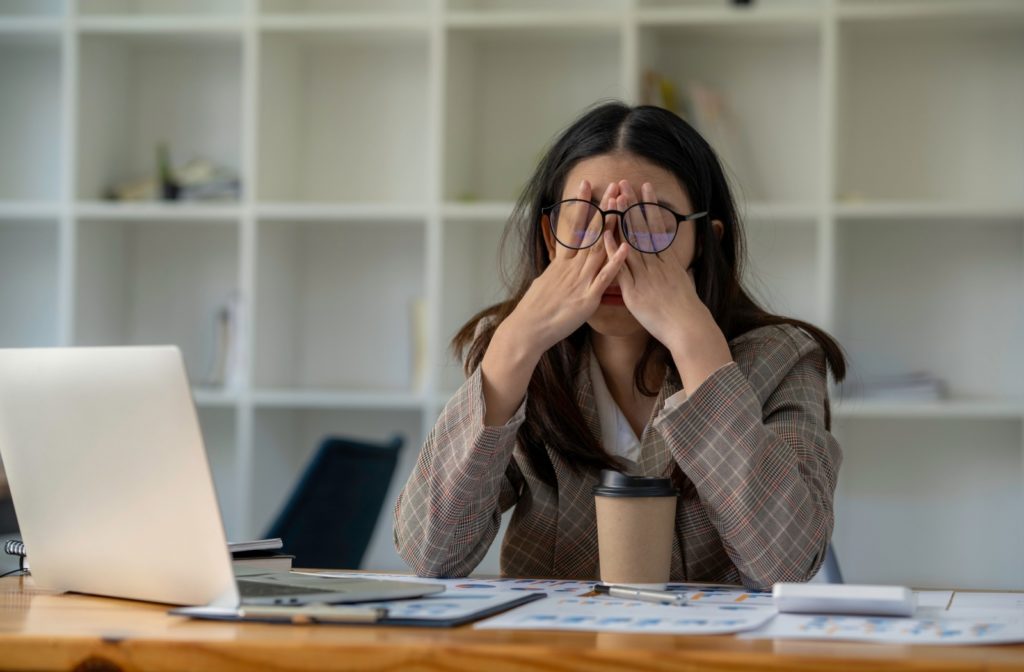Anxiety is a common experience for many people, but its effects often extend far beyond what we expect. From an increased heart rate to tension headaches, anxiety has a way of influencing both our minds and bodies. While many are aware of these common symptoms, fewer people know that anxiety can also affect vision.
Yes, anxiety can cause vision problems such as blurred vision, sensitivity to light, and tunnel vision. These symptoms can be unsettling, but once you understand the connection between anxiety and vision, the answer can become clear. If you’re unsure what’s causing your vision problems, your optometrist is here to help.
What Is Anxiety?
Anxiety is a normal response to stress or perceived threats. It’s a complex emotional state that can manifest as feelings of unease, worry, or fear. While occasional anxiety is a common part of life, excessive or persistent anxiety can significantly impact our well-being.
Anxiety and stress are often used interchangeably, but they’re not exactly the same. Stress is normally a short-term response to a recognizable threat, while anxiety lingers—even after the stressful situation is over.
Anxiety’s Impact on Vision
When anxiety kicks in, it activates the body’s “fight, flight, or freeze” response, releasing stress hormones like adrenaline and cortisol. These hormones prepare the body to react to stress but can also interfere with normal bodily functions—including vision. Here’s how anxiety can manifest in your eyesight:
- Blurred vision: Typically, a stress response causes your vision to become sharper. However, long-term anxiety can increase your blood pressure to levels that can cause damage to the retina, making it harder for the eyes to focus clearly.
- Tunnel vision: Anxiety can cause you to hyper-focus on a specific object or task, eliminating peripheral vision temporarily.
- Light sensitivity: The heightened stress response may cause your pupils to dilate, allowing more light into the eye. While this can be helpful in some situations, it could also make your eyes more sensitive to light, causing discomfort in bright settings.
- Increased eye pressure: Stress can raise the pressure inside your eyes, which, over time, can increase the risk of glaucoma—a condition that can damage your optic nerve and affect your vision.
- Eye twitching: Anxiety can manifest in physical ways, such as eye twitching. These involuntary eyelid spasms often occur during periods of high stress and while usually harmless, your optometrist can examine persistent twitching to rule out other causes.
- Dry eyes: Anxiety isn’t a common cause of dry eye, but some research suggests that dry eyes are more common among people with anxiety. This may be due to poor sleep or some other stress response in the body.
These issues are often temporary, but when anxiety becomes chronic, the strain on your visual system can persist, leading to longer-term discomfort.

When Should You Seek Professional Help?
You may feel anxious and you may notice some vision problems, but when is it time to figure out if they’re linked? The answer is generally that when you’re worried about your or your family’s eye health, it’s always a good time to visit your optometrist!
While many symptoms are temporary, you shouldn’t ignore persistent or worsening issues. Here are some signs that you should consult a specialist:
- Vision disturbances persist for more than a few days, even after you’re not feeling as anxious.
- You experience sudden or severe vision changes, such as complete loss of vision, double vision, or sharp pain in the eyes.
- You notice other symptoms, such as headaches, dizziness, or difficulty balancing, accompanying your vision problems.
Your optometrist or ophthalmologist can rule out underlying conditions, provide specific treatments for vision issues, and—if stress or anxiety is the problem—they may be about to offer some tips for managing anxiety’s impact on your eyes.
Tips for Coping with Anxiety & Vision Problems
Long-term anxiety may require professional help, but there are still some things you can do to nudge yourself toward healthy vision while practicing mindfulness.
Practice Relaxation Techniques
- Deep breathing: Practice slow, intentional breathing to reduce stress and oxygenate your body.
- Mindfulness & meditation: Calm your mind and reduce overall anxiety that may be contributing to vision problems.
- Progressive muscle relaxation: Relieve tension by tensing, then relaxing each of your muscle groups one at a time. This can be done sitting or lying down and you want to start with your feet and move up.
Maintain Proper Eye Health
- Digital health: Remind yourself to blink regularly to combat dryness and take breaks, especially during screen time.
- Hydrate your eyes: Use lubricating eye drops if your doctor advises you to.
- Stop UV damage: Protect your eyes from harsh light with sunglasses.
Adopt a Healthy Lifestyle
- Sleep well: Prioritize 7–8 hours of quality rest to allow your body to recover.
- Eat a balanced diet: Include eye-friendly nutrients like vitamins A, C, and E in your meals. At the same time, reduce your consumption of caffeine and sugar, which can aggravate both anxiety and vision problems.
- Exercise regularly: Gentle exercise can improve overall blood circulation, including to the eyes. It can also help reduce stress.
Clear Your Vision With a Clear Mind
Coping with anxiety-related vision problems can feel daunting, but with the right strategies and support, relief is within reach. By addressing both your mental health and eye care, you can improve your quality of life—and see the world more clearly again!
If vision problems are disrupting your daily life, don’t ignore the signs. Ladera Ranch Optometry’s highly-trained optometrists are here to help. We can examine your eyes and put you on the path to relief—so you can rest easy knowing you’re in good hands. Book an appointment today and take the first step toward healthier eyes and peace of mind!



